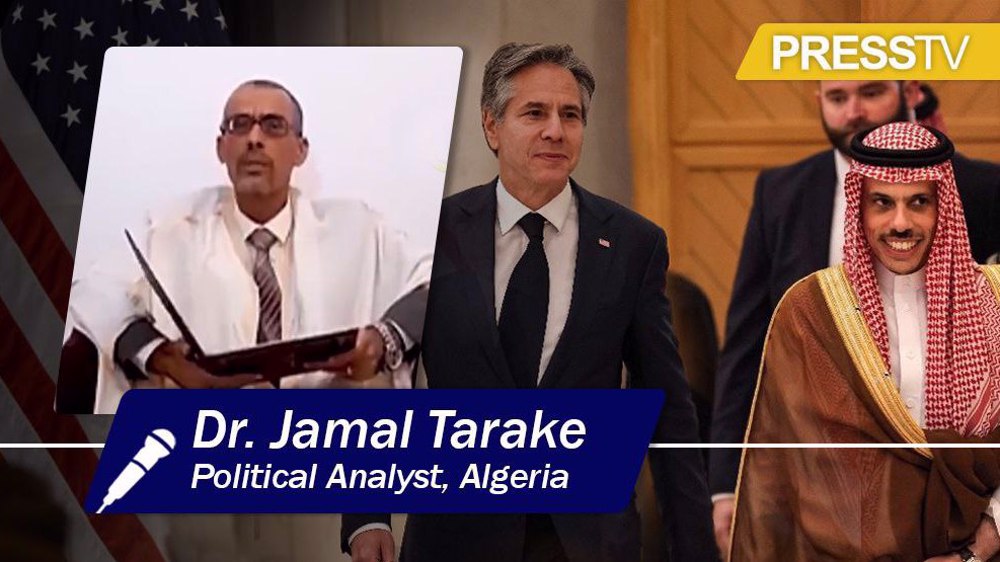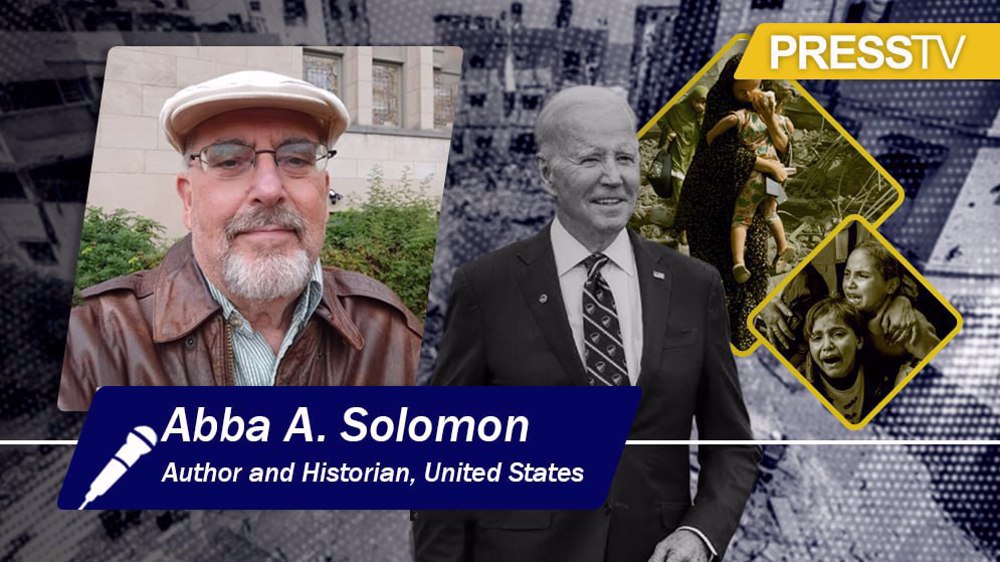US no longer sole global power, cannot impose its will on others: Expert
A senior Algerian political analyst says the United States is well aware that it has lost its superpower position in the world and can no more impose its views on other countries.
Jamal Tarake made the remarks in an exclusive interview with the Press TV website on Saturday, while elaborating on a recent visit by US Secretary of State Antony Blinken to Saudi Arabia.
He said Blinken’s visit and his meetings with the Saudi foreign minister, and later with foreign ministers of the Persian Gulf Cooperation Council’s member states was made in the light of recent developments in the West Asia region as well as internal challenges facing the US government.
“We are witnessing a wave of reconciliations and agreements in the West Asia region, including the détente between Qatar and Saudi Arabia, the United Arab Emirates and Bahrain, as well as improvement in Iraq’s relations with the Persian Gulf states,” he said.
Tarake added that the important agreement between the Islamic Republic of Iran and Saudi Arabia, as two significant countries in the region, which was mediated by China, paved the way for the improvement of Riyadh’s relations with Damascus. “As a result, Syria has now returned to the Arab League.”
The analyst said Syria’s return to the Arab League and a subsequent visit to Yemeni capital city of Sana'a by Saudi Arabia’s ambassador to the country, provided the necessary ground for ending the Saudi-led war against the oppressed people of Yemen.
“The United States is well aware that it is no more the sole global power to be able to impose its viewpoints and will on any region of the world. In Asia, the US is faced with a powerful rival in the form of China, while in Europe, it has to deal with a power like Russia. Even Iran [is now a power], which Washington has not been able to tame and bring to its knees,” Tarake added.
He then pointed to the internal crises with which the US government has been grappling following the election of President Joe Biden, saying those crises have deepened rifts and divergence within the American society.
“All these [regional and global] developments point to failure of the United States and its inability to impose its will on its [regional] allies, the most important of which is Saudi Arabia,” the analyst added.
Tarake stated that Saudi Arabia no more trusts the United States, because it ignored both Riyadh and other Persian Gulf states during nuclear talks with Iran, and also failed to protect Saudi Arabia against missile and drone attacks by Yemen’s Ansarullah movement.
He said the Saudi murder of dissident journalist, Jamal Khashoggi, also faced US-Saudi relations with a major challenge, as Biden vowed that his murder will not go unpunished. “Later on, he went back on that position as a result of the weakness and reduced power of the United States.”
The analyst added that following that development and during a visit to Saudi Arabia, Biden urged Saudi Crown Prince Mohammed bin Salman to increase the country’s oil output in order to reduce its price, but Bin Salman preferred to reduce Saudi oil production in agreement with Russia.
“Saudi Arabia is currently playing with the card of not normalizing its relations with Israel, because its leaders are well aware that under the current circumstances, normalization [with Israel] will be an achievement for the entrenched cabinet of [Israeli Prime Minister Benjamin] Netanyahu. It can also be used as leverage in [any future] elections by Biden and Democrats against Republicans in order to gain the support of the Zionist lobby,” Tarake said.
He emphasized that Saudi Arabia is not willing to be a vanguard in normalizing relations with Israel. “Since its leaders consider themselves ‘Custodian of the Two Holy Mosques’, in order to avoid hurting the feelings of Muslims, Saudi Arabia prefers to be the last country to take this step.”
The analyst said after failing to prevent Iran-Saudi détente or improvement of Riyadh’s relations with Damascus, the United States is now trying to create problems in order to slow down this process and block further proximity among various groups that form the Islamic Ummah, including Sunnis, Shias, Arabs and non-Arabs like Persians, Kurds, Turks and so forth.
Tarake also touched on Washington’s double-standard approach to the Yemen war, saying the war in Yemen is used by the United States as a trump card to mount pressure on Saudi Arabia.
“Riyadh’s defense structure is 100% dependent on the United States and NATO when it comes to arms and strategies. Therefore, Saudi Arabia is concerned about losing Washington’s support in case of any unilateral action [in the Yemen war]. This could lead to Saudi Arabia’ defeat in any new war with Ansarullah and others,” he said.
Tarake said the United States believes if the Yemen war ended in this way, it would pose a risk to its ally, Israel, and also to marine transit through the strategically important Bab al-Mandab Strait.
“Therefore, it is urging Saudi Arabia to adopt a ‘neither war, nor peace’ approach, so that, Israel’s interests won’t be harmed and the Resistance Front, led by Iran, won’t get stronger.”
South Korean President Yoon arrested over failed martial law bid
VIDEO | Press TV's news headlines
US budget deficit surges to record $711 billion
VIDEO | Yemeni army conducts three attacks against Israel within 12 hours
VIDEO | Gaza’s kidney patients face imminent death amid lack of fuel
Yemeni drones hit targets in Israel-occupied Yaffa
VIDEO | Is the worst yet to come?
ICC prosecutor pushes rejection of appeal on Netanyahu arrest warrant










 This makes it easy to access the Press TV website
This makes it easy to access the Press TV website